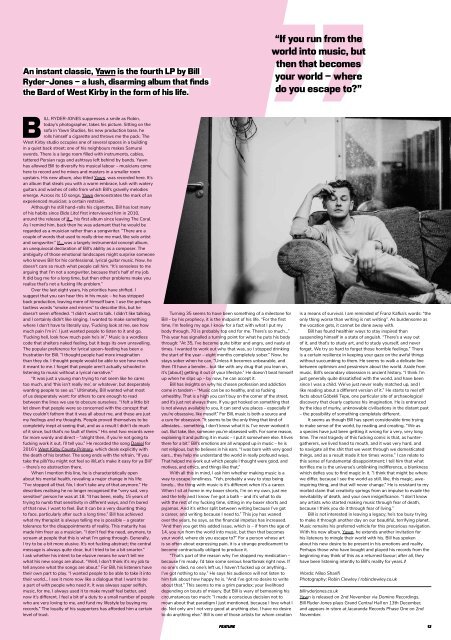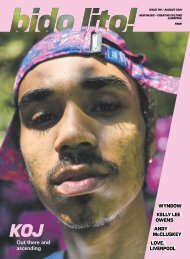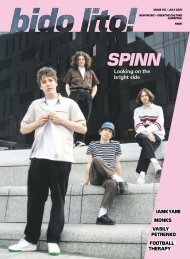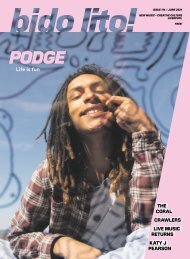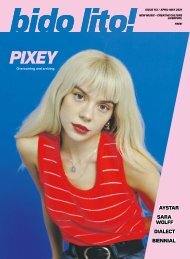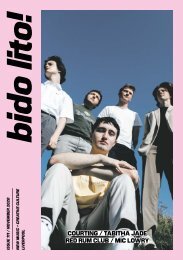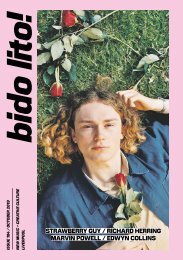Issue 94 / November 2018
November 2018 issue of Bido Lito! magazine. Featuring: BILL RYDER-JONES, JAMIE BROAD, JONH WATERS, HINDS, THE ALEPH, SARA WOLFF, LIVERPOOL BIENNIAL 2018, ACID CORBYNISM, TELEMAN and much more.
November 2018 issue of Bido Lito! magazine. Featuring: BILL RYDER-JONES, JAMIE BROAD, JONH WATERS, HINDS, THE ALEPH, SARA WOLFF, LIVERPOOL BIENNIAL 2018, ACID CORBYNISM, TELEMAN and much more.
You also want an ePaper? Increase the reach of your titles
YUMPU automatically turns print PDFs into web optimized ePapers that Google loves.
An instant classic, Yawn is the fourth LP by Bill<br />
Ryder-Jones – a lush, disarming album that finds<br />
the Bard of West Kirby in the form of his life.<br />
“If you run from the<br />
world into music, but<br />
then that becomes<br />
your world – where<br />
do you escape to?”<br />
BILL RYDER-JONES suppresses a smile as Robin,<br />
today’s photographer, takes his picture. Sitting on the<br />
sofa in Yawn Studios, his new production base, he<br />
rolls himself a cigarette and throws me the pack. The<br />
West Kirby studio occupies one of several spaces in a building<br />
in a quiet back street; one of his neighbours makes Samurai<br />
swords. There is a large room filled with instruments, cables,<br />
tattered Persian rugs and ashtrays left behind by bands. Yawn<br />
has allowed Bill to diversify his musical labour – musicians come<br />
here to record and he mixes and masters in a smaller room<br />
upstairs. His new album, also titled Yawn, was recorded here. It’s<br />
an album that steals you with a warm embrace, lush with watery<br />
guitars and washes of cello from which Bill’s gravelly melodies<br />
emerge. Across its 10 songs, Yawn demonstrates the mark of an<br />
experienced musician; a certain restraint.<br />
Although he still hand-rolls his cigarettes, Bill has lost many<br />
of his habits since Bido Lito! first interviewed him in 2010,<br />
around the release of If…, his first album since leaving The Coral.<br />
As I remind him, back then he was adamant that he would be<br />
regarded as a musician rather than a songwriter. “There are a<br />
couple of words that used to really drive me mad, like solo artist<br />
and songwriter.” If… was a largely instrumental concept album,<br />
an unequivocal declaration of Bill’s ability as a composer. The<br />
ambiguity of those emotional landscapes might surprise someone<br />
who knows Bill for his confessional, lyrical guitar music. Now, he<br />
doesn’t care so much what people call him. “It’s senseless to me<br />
arguing that I’m not a songwriter, because that’s half of my job.<br />
It did bug me for a long time, but then other problems make you<br />
realise that’s not a fucking life problem.”<br />
Over the last eight years, his priorities have shifted. I<br />
suggest that you can hear this in his music – he has stripped<br />
back production, leaving more of himself bare. I use the perhaps<br />
tactless words “smoke and mirrors” to describe this, but he<br />
doesn’t seem offended. “I didn’t want to talk. I didn’t like talking,<br />
and I certainly didn’t like singing. I wanted to make something<br />
where I don’t have to literally say, ‘Fucking look at me, see how<br />
much pain I’m in’. I just wanted people to listen to it and go,<br />
‘Fucking hell, look how much pain he’s in’.” Music is a wordless<br />
code that shelters naked feeling, but it begs its own unravelling.<br />
The popular preference for lyrical spoon-feeding has been a<br />
frustration for Bill. “I thought people had more imagination<br />
than they do. I thought people would be able to see how much<br />
it meant to me. I forget that people aren’t actually schooled in<br />
listening to music without a lyrical narrative.”<br />
“It was just a young man trying to not seem like he cares<br />
too much, and ‘this isn’t really me’, or whatever, but desperately<br />
wanting people to see us.” Ultimately, Bill wanted what most<br />
of us desperately want: for others to care enough to read<br />
between the lines we use to obscure ourselves. “I felt a little bit<br />
let down that people were so concerned with the concept that<br />
they couldn’t fathom that it was all about me, and these are just<br />
my feelings and my thoughts. People proved themselves to be<br />
completely inept at seeing that, and as a result I didn’t do much<br />
of it since, but that’s no fault of theirs.” His next two records were<br />
far more wordy and direct – “alright then, if you’re not going to<br />
fucking work it out, I’ll tell you.” He recorded the song Daniel for<br />
2016’s West Kirby County Primary, which deals explicitly with<br />
the death of his brother. The song ends with the refrain, “If you<br />
take the pill/You might not feel so ill/Let’s make it easy for ya Bill”<br />
– there’s no abstraction there.<br />
When I mention this line, he is characteristically open<br />
about his mental health, revealing a major change in his life:<br />
“I’ve stopped all that. No, I don’t take any of that anymore.” He<br />
describes realising he no longer recognised the “very sad, very<br />
sensitive” person he was at 18. “It has been, really, 15 years of<br />
trying to numb that sensitivity in different ways, and I’m bored<br />
of that now. I want to feel. But it can be a very daunting thing<br />
to face, particularly after such a long time.” Bill has achieved<br />
what my therapist is always telling me is possible – a greater<br />
tolerance for the disappointments of reality. This maturity has<br />
made him freer as a musician. “I don’t feel the need, anymore, to<br />
scream at people that this is what I’m going through. Generally,<br />
I try to be a bit more elusive. It’s not fucking abstract; the central<br />
message is always quite clear, but I tried to be a bit smarter.”<br />
I ask whether his intent to be elusive means he won’t tell me<br />
what his new songs are about. “Well, I don’t think it’s my job to<br />
tell anyone what the songs are about.” For Bill, his listeners have<br />
their own part to play. “I wanted people to be able to take it into<br />
their world… I see it more now like a dialogue that I want to be<br />
a part of with people who need it. It was always super selfish,<br />
music, for me. I always used it to make myself feel better, and<br />
now it’s different. I feel a bit of a duty to a small number of people<br />
who are very loving to me, and fund my lifestyle by buying my<br />
records.” The loyalty of his supporters has afforded him a certain<br />
level of trust.<br />
Turning 35 seems to have been something of a milestone for<br />
Bill – by his prophecy, it is the midpoint of his life. “For the first<br />
time, I’m feeling my age. I know for a fact with what I put my<br />
body through, 70 is probably top end for me. There’s so much…”<br />
This year has signalled a turning point for what he puts his body<br />
through: “At 35, I’ve become quite bitter and angry, and nasty at<br />
times. I wanted to work out why that was, so I stopped drinking<br />
the start of the year – eight months completely sober.” Now, he<br />
stays sober when he can, “Unless it becomes unbearable, and<br />
then I’ll have a bender... but like with any drug that you lean on,<br />
it’s [about] getting it out of your lifestyle.” He doesn’t beat himself<br />
up when he slips up – by now, he can accept it.<br />
Bill has insights on why his chosen profession and addiction<br />
come in tandem – “Music can be so healthy, and so fucking<br />
unhealthy. That is a high you can’t buy on the corner of the street,<br />
and it’s just not always there. If you get hooked on something that<br />
is not always available to you, it can send you places – especially if<br />
you’re obsessive, like myself.” For Bill, music is both a source and<br />
a cure for obsession. “It seems to be the only thing that kind of<br />
alleviates… something, I don’t know what it is. I’ve never worked it<br />
out. But take, like, someone you’re obsessed with. For some reason,<br />
explaining it and putting it in music – I put it somewhere else. It lives<br />
there for a bit.” Bill’s emotions are all wrapped up in music – he is<br />
not religious, but he believes in his ears. “I was born with very good<br />
ears… they help me understand the world in really profound ways.<br />
That helped me work out which people I thought were good, and<br />
motives, and ethics, and things like that.”<br />
With all this in mind, I ask him whether making music is a<br />
way to escape loneliness. “Yeh, probably a way to stop being<br />
lonely… the thing with music is it’s different when it’s a career.<br />
When I sit at home in my boxer shorts, I’m on my own, just me<br />
and the telly and I know I’ve got a bath – and it’s what to do<br />
with the rest of my fucking time, sitting in my boxer shorts and<br />
pyjamas. And it’s either split between writing because I’ve got<br />
a career, and writing because I need to.” This joy has waned<br />
over the years, he says, as the financial impetus has increased.<br />
“And then you get this added issue, which is – if from the age of<br />
14, you run from the world into music, but then that becomes<br />
your world, where do you escape to?” For a person whose art<br />
is so often about expressing pain, it is a strange predicament to<br />
become contractually obliged to produce it.<br />
“That’s part of the reason why I’ve stopped my medication –<br />
because I’m ready. I’d take some serious heartbreak right now. If<br />
no one’s died, no one’s left us, I haven’t fucked up or anything…<br />
I’ve got nothing to say.” He says his audience will not listen to<br />
him talk about how happy he is. “And I’ve got no desire to write<br />
about that.” This seems to me a grim paradox; your livelihood<br />
depending on bouts of misery. But Bill is wary of bemoaning his<br />
circumstances too much: “I made a conscious decision not to<br />
moan about that paradigm I just mentioned, because I love what I<br />
do. Not only am I not very good at anything else, I have no desire<br />
to do anything else.” Bill is one of those artists for whom creation<br />
is a means of survival. I am reminded of Franz Kafka’s words: “the<br />
only thing worse than writing is not writing”. As burdensome as<br />
the vocation gets, it cannot be done away with.<br />
Bill has found healthier ways to stay inspired than<br />
suspending himself in a state of anguish. “There’s a way out<br />
of it, and that’s to study art, and to study yourself, and never<br />
forget. We try so hard to forget those horrible feelings.” There<br />
is a certain resilience in keeping your gaze on the awful things<br />
without succumbing to them. He seems to walk a delicate line<br />
between optimism and pessimism about the world. Aside from<br />
music, Bill’s secondary obsession is ancient history. “I think I’m<br />
just generally quite dissatisfied with the world, and have been<br />
since I was a child. We’ve just never really matched up, and I<br />
like reading about a different version of it.” He starts to reel off<br />
facts about Göbekli Tepe, one particular site of archaeological<br />
discovery that clearly captures his imagination. He is entranced<br />
by the idea of murky, unknowable civilisations in the distant past<br />
– the possibility of something completely different.<br />
It seems as though Bill has spent considerable time trying<br />
to make sense of the world, by reading and creating. “We as<br />
a species have just been getting it wrong for a very, very long<br />
time. The real tragedy of this fucking comic is that, as huntergatherers,<br />
we lived hand to mouth, and it was very hard, and<br />
to navigate all the shit that we went through we domesticated<br />
things, and as a result made it ten times worse.” I can relate to<br />
this sense of fundamental disappointment; I tell him that what<br />
terrifies me is the universe’s unblinking indifference, a blankness<br />
which defies you to find magic in it. “I think that might be where<br />
we differ, because I see the world as still, like, this magic, aweinspiring<br />
thing, and that will never change.” He is resistant to my<br />
morbid claim that creativity springs from an impulse to evade the<br />
inevitability of death, and your own insignificance. “I don’t know<br />
any artists who started making music through fear of death,<br />
because I think you do it through fear of living.”<br />
Bill is not interested in leaving a legacy; he’s too busy trying<br />
to make it through another day on our beautiful, terrifying planet.<br />
Music remains his preferred vehicle for this precarious navigation.<br />
With his new album, Yawn, he extends another invitation for<br />
his listeners to mingle their world with his. Bill has spoken<br />
about his new desire to be present in his emotions and reality.<br />
Perhaps those who have bought and played his records from the<br />
beginning may think of this as a returned favour; after all, they<br />
have been listening intently to Bill’s reality for years. !<br />
Words: Niloo Sharifi<br />
Photography: Robin Clewley / robinclewley.co.uk<br />
billryderjones.co.uk<br />
Yawn is released on 2nd <strong>November</strong> via Domino Recordings.<br />
Bill Ryder-Jones plays Grand Central Hall on 13th December,<br />
and appears in-store at Jacaranda Records Phase One on 2nd<br />
<strong>November</strong>.<br />
FEATURE<br />
13


